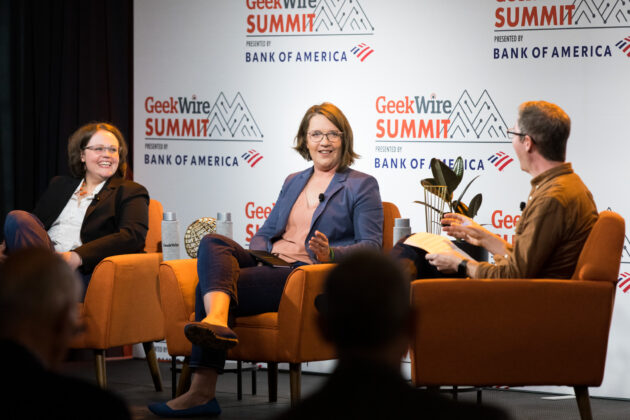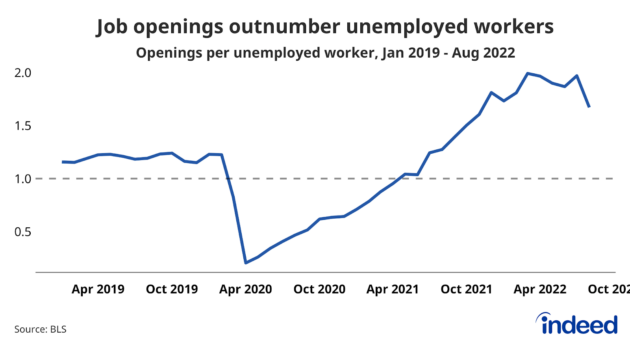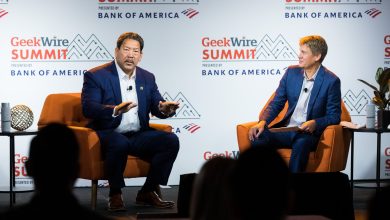Chief economists at Zillow and Certainly analyze the shaky financial system and its influence on hiring

The labor market is still strong but shows signs of cooling, interest rates are high, and where and how people work continues to change rapidly.
To make sense of the shifting economic winds, two economists shared their analyses at the GeekWire Summit on Thursday: Skylar Olsen, chief economist at Zillow Group and Svenja Gudell, chief economist at career site Indeed. They were joined by host Noah Buhayar, data editor at Bloomberg News.
The panelists discussed the rapid rise in inflation, driven by factors such as a tight hiring market and kinks in the supply chain, and the cooling effect of soaring interest rates. How does all this affect employers, workers, and the housing market?
Read on for highlights from the discussion.
Hiring is happening but there are signs of a cooldown
The labor market is still strong, said Gudell. Indeed’s job listing count is up about 50% over pre-pandemic levels.
The unemployment rate stood near a five-decade low in August, at 3.7%.
“Workers still have the upper hand. It’s a tight market and employers are having a hard time recruiting,” said Gudell. But there are signs that workers may be beginning to, only slightly, lose their advantage.
Wages rose for the last two or so years, but more recently the increase in inflation has cut into the gains. “We don’t see a lot of people actually getting a real increase in their pay at this point,” said Gudell.
In the tech world, Microsoft is slowing hiring and Amazon is reportedly freezing hiring for corporate roles in its retail business. Smaller tech companies may be more vulnerable to economic shifts like inflation increases, said Gudell. A bevy of startups have laid off workers this year.
“Particularly in tech, where we saw crazy amounts of hiring during the pandemic, a lot of employers are taking a step back and thinking, ‘Okay, we’ve hired a lot, let’s not hire quite as much anymore,’” said Gudell.
In the economy overall though, said Gudell, “there’s still a lot of hiring going on out there.”

Inflation is affecting how employers hire and retain workers
With rising inflation, employers are looking beyond salary to coax workers, said Gudell. Many are rounding up compensation packages with various perks such as remote working options. “We’re seeing some extreme movements on benefits,” she said.
Remote options are broadening the workforce
About one third of jobs can be done remotely, and that is luring in new workers, including women with children and people with disabilities. “Remote is here to stay,” said Gudell. It’s also a perk in a tight job market, she added.
People are coming back to work
The pandemic saw an exodus of people at or close to retirement age from the workforce, along with women, who have a higher burden of caregiving.
A lot of those people are starting to come back, said Gudell. Some see the value of their retirement portfolios languishing in the stock market. Kids are back in school and remote work options are also a pull. Indeed’s latest data show an influx of women aged 29 to 54 into the job market.
“People are coming off of the sidelines,” said Gudell. The increased supply of workers will also relax the upward spiral of wage growth and inflation, she said.
Housing prices are stabilizing
With fast-rising interest rates, the housing market is rapidly cooling: Zillow’s latest projections show home value growth slowing to 1.4% in the coming year, from the current rate of 14.1% annual growth.
With interest rates on mortgages now above 6%, fewer people have incentive to sell their home and move into a new one, said Olsen. That will also keep supply constricted and keep prices from plunging. “I can’t promise super significant price corrections,” she said.
That makes the decision to buy a home more complex as well. “This is a complicated financial picture,” said Olsen, “It’s much more personal about what the right decision is.”
In markets like Seattle the high cost of housing will continue to contribute to social inequality, added Olsen.
Positive signs in the data
Panelists were asked what data points give them reason for optimism.
Gudell said the pandemic has been good for the wages of low income and frontline workers. She’s also pleased by the growth of diversity, equity and inclusion programs.
Olsen said there are a lot of permits for housing construction and units being built in the U.S. And that should help keep housing more affordable.
Is a recession on the horizon?
Olsen said it’s “very, very challenging” to forecast the housing market given rapidly shifting factors like rising interest rates. It’s even harder to predict where the larger economy will go.
Economies in Europe have been more affected by Russia’s war on Ukraine. But in the U.S., “there’s still chance that we do a soft landing,” and avoid a recession, said Gudell.
Meanwhile, supply chains in the U.S. are improving and that will calm inflation in the U.S., she said. “We are moving in the right direction on the path towards normalization,” said Gudell.
Advice for business leaders
“Make sure your business decisions are going to be resilient with a really large margin for error,” said Olsen.
Conclusion: So above is the Chief economists at Zillow and Certainly analyze the shaky financial system and its influence on hiring article. Hopefully with this article you can help you in life, always follow and read our good articles on the website: Doshared.com




